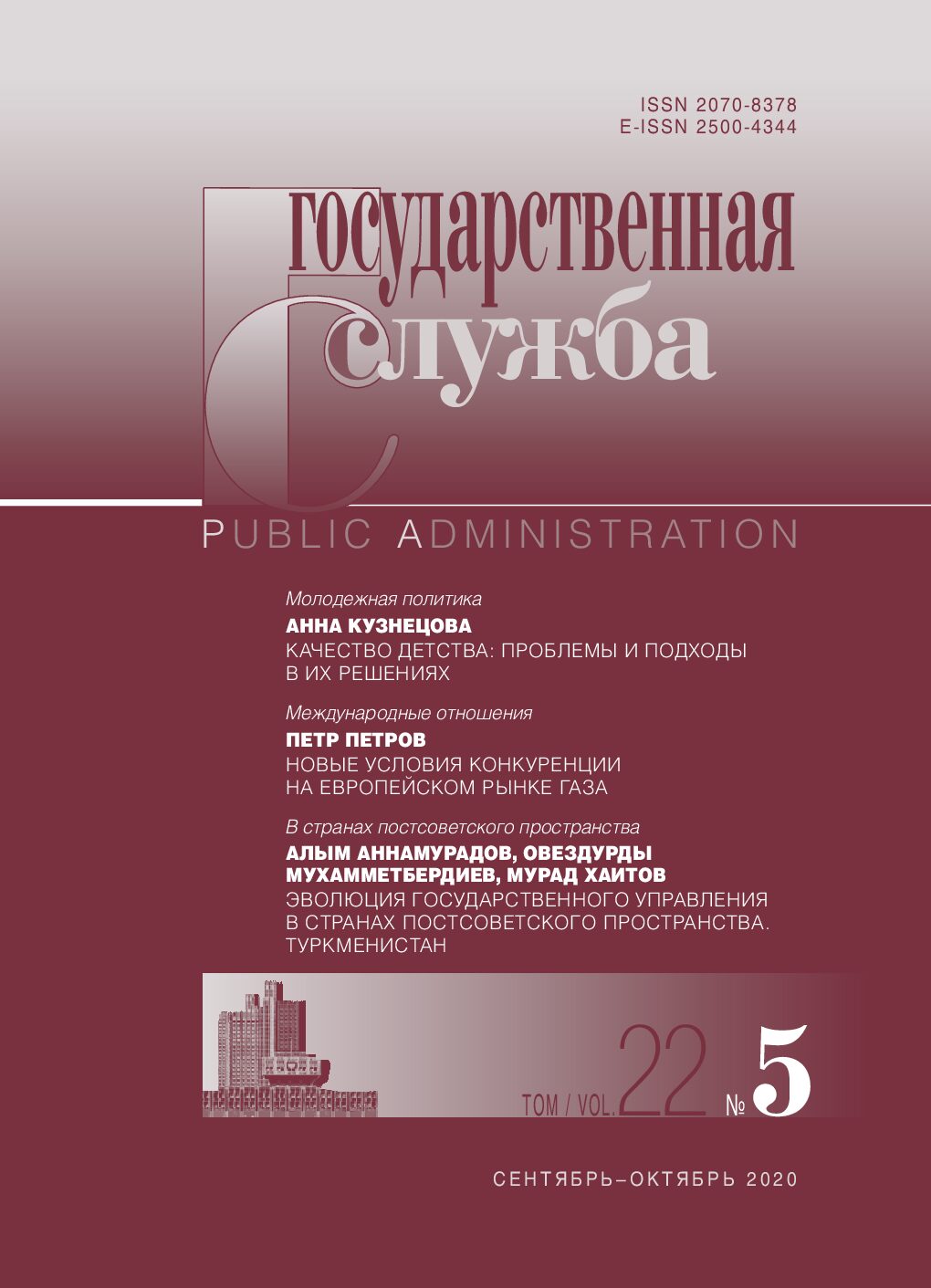Recommended link to article:
PETER ILIEV PETROVа
аEmbassy of the Republic of Bulgaria in the Russian Federation
DOI: 10.22394/2070-8378-2020-22-5-84-92
Abstract:
This article aims to discuss the process of liberalization of the natural gas market in the European Union (EU). The purpose of this research is to show the fundamental characteristics of the gas industry, the process of reconstruction of the European gas market, taking into account the ongoing changes in the context of geopolitical, ecological, and technological determinants of the international and European energy and gas sector. The article describes the structure of the modern European natural gas market, compares the competitiveness of gas transportation methods through trunk pipelines and gas tankers transporting liquefied natural gas. The article examines the impact of the increase in the supply of liquefied natural gas on the situation with the turnover of gas trade in the European market, in particular, how it affects the delivery of hydrocarbons and the growth in the scale of exchange trading. The article examines the Groningen model, which influences the development of gas exchange trading and natural gas trading through long-term contracts. The evolution of the European policy in the field of natural gas, the established strictly regulated version of the “well-functioning” gas market, remains as one too political and unstable experiment. The importance of natural gas changes all the time, depending on economics, the security of deliveries, and sustainability. Furthermore, the focus on that importance and its practical application vary in different parts of Europe. The conclusion is made that a “well-functioning” gas market is characterized by the presence of a large number of suppliers, and competition leads to a noticeable decrease in prices for natural gas. However, in the current situation, the demand for gas turns out to be unstable, and difficult conditions for pipeline supplies are emerging for traditional suppliers. In the long term, the “wellfunctioning” gas market scheme will remain highly politicized and unstable, with increased competition in supply and a downward trend in gas prices. Thus, the European gas market is transforming towards the formation of a “buyer’s market”.
Keywords:
European Union, natural gas, gas market liberalization, LNG, competition in the gas market
Received:
March 2, 2020
References:
Opportunities and prospects for the development of low-capacity LNG in Russia. Energy Centre, Moscow school of management “Skolkovo”. 2018. In Russian
Konoplyanik A. A. Cutting into Europe. The United States is using any means to “push” its LNG into the European gas market. Neftegazovaya vertikal. 2019. No. 5-6. P. 61-69. In Russian
Konoplyanik A. A. Price of energy: international pricing mechanisms for oil and gas. Energy charter secretariat. 2007. URL: https:// www.energycharter.org/fileadmin/DocumentsMedia/Thematic/Oil_and_Gas_Pricing_2007_en.pdf. In English
Global and Russian energy outlook. Energy Centre, Moscow school of management “Skolkovo”. 2019. In Russian
Evolution of the global energy market pricing system: economic consequences for Russia. Edited by Malikova O. I., Orlova E. S. Monograph. Moscow State University. 2017. In Russian
Austvik O. G. The energy union and security-of-gas supply. Energy Policy. 2016. Р. 372-382. URL: https://www.sciencedirect.com/ science/article/pii/S0301421516302968. In English
Boersma T. Energy Security and Natural Gas Markets in Europe: Lessons from the EU and the United States. Routledge Studies in Energy Policy. 2015. In English
Boersma T. The Termination of Groningen Natural Gas Production – Background and Next Steps. Columbia University. Center on Global Energy Policy. 2018. URL: https://www.researchgate. net/publication/326930490_The_Termination_of_Groningen_ Natural_Gas_Production_-_Background_and_Next_Steps. In English
Bulgaria: The role of natural gas in decarburization. Baringa. Shell Bulgaria. 2018. In English
Correljé A. The European Natural Gas Market. 2016. DOI: 10.1007/ s40518-016-0048-y
Correljé A., Groenleer M., Veldman J. Understanding institutional change: the development of institutions for the regulation of natural gas supply systems in the US and the EU. Competition and Regulation in Network Industries. 2013. No. 7. P. 2-13. In English
Correljé A. FJG, Van der Linde JG, Westerwoudt T. Natural gas in the Netherlands: from cooperation to competition? The Hague: Clingendael, International Energy Programme/Oranje Nassau. 2003. In English
Dickel R. The role of natural gas, renewables and energy efficiency in decarbonisation in Germany: The need to complement renewables by decarbonized gas to meet the Paris targets. OIES. 2018. URL: https://www.oxfordenergy.org/wpcms/wp-content/ uploads/2018/04/The-Role-of-Natural-Gas-Renewables-andEnergy-Efficiency-in-Decarbonisation-in-Germany-The-needto-complement-renewables-by-decarbonized-gas-to-meet-theParis-targets-NG-129.pdf?v=461b1990fe86. In English
Glachant J-M, Hallack M., Vazquez M., Ruester S., Ascari S. Building competitive gas markets in the EU: regulation, supply and demand. Cheltenham. Edward Elgar. 2013. In English
Hallack M., Vazquez M. European Union regulation of gas transmission services: challenges in the allocation of network resources through entry/exit schemes. Utilities Policy. 2013. Vol. 25. P. 23-32. DOI: 10.1016/j.jup.2013.01.003. In English
Joskow P. J. Regulation of natural monopolies. In: Handbook of law and economics. Ed. by Polinsky A. M., Shavell S. 2007. Volume 2. In English
Keay M., Robinson D. Managing electricity decarbonisation: Learning from experience – the cases of the UK and Spain. OIES. 2017. https://www.oxfordenergy.org/wpcms/wp-content/ uploads/2017/04/Managing-Electricity-Decarbonisation-OIES-Energy-Insight.pdf. In English
MacAvoy P. W. The natural gas market: sixty years of regulation and deregulation. New Haven. Yale University Press. 2000. In English
Makholm J. D. The political economy of pipelines. Chicago. University of Chicago Press. 2012. In English
Pirani S. Azerbaijan’s gas supply squeeze and the consequences for the Southern Corridor. OIES. 2016. URL: https://www.oxfordenergy.org/wpcms/wp-content/uploads/2016/07/Azerbaijansgas-supply-squeeze-and-the-consequences-for-the-SouthernCorridor-NG-110.pdf?v=461b1990fe86. In English
Pirani S. Russia-Ukraine transit talks: the risks to gas in Europe. OIES. 2019. URL: https://www.oxfordenergy.org/wpcms/ wp-content/uploads/2019/05/Russia-Ukraine-transit-talksthe-risks-to-gas-in-Europe.pdf?v=461b1990fe86. In English
Stern J. Challenges to the future of gas: Unburnable or unaffordable? OIES. 2017. URL: https://doi.org/10.26889/9781784670993. In English
80 final energy union packages. A framework strategy for a resilient energy union with a forward-looking climate change policy. European Commission. Brussels. 2015. URL: https://eur-lex. europa.eu/resource.html?uri=cellar:1bd46c90-bdd4- 11e4-bbe1-01aa75ed71a1.0001.03/DOC_1&format=PDF. In English
Articles in Open Access mode are published under the Creative Commons Attribution 4.0 International (CC BY) license.

